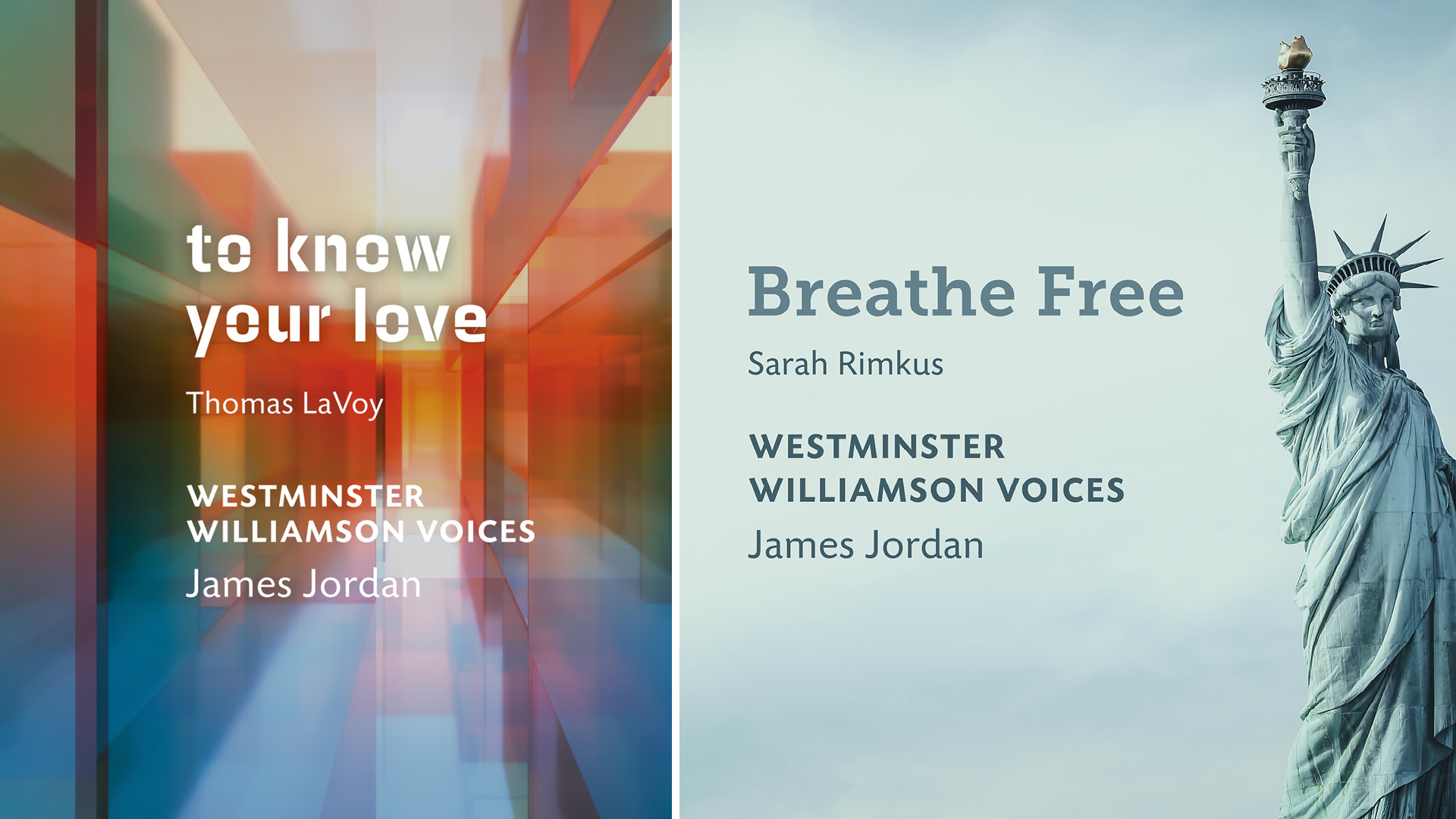Thursday, Sep 23, 2021
Available on all major digital streaming sites.
by Anne Sears
As the 2020-21 academic year came to a close in April 2021, the Westminster Williamson Voices and conductor James Jordan surmounted the challenges that Covid-19 protocols presented to choral ensembles worldwide and produced recordings of two works composed for the ensemble and reflecting some of the era’s historic events. Both works — to know your love composed by Westminster alumnus Thomas LaVoy ’13 and Breathe Free composed by Sarah Rimkus — will be released digitally on Sept. 24 and available on all major digital streaming sites, including Spotify, Apple Music and Amazon Music.
Conductor James Jordan said about the project, “Westminster Williamson Voices and I are incredibly proud of these recordings, which were made in Gill Memorial Chapel on the Rider University campus following all Covid-19 safety protocols. Both works deal in very deeply human ways with life challenges. Both use choral improvisation, which has been championed by the Williamson Voices for the past five years. And both pieces open the door for new sound worlds for choral ensembles. Throughout the pandemic, we developed new pedagogies for learning music virtually. In the truest of Westminster traditions, a remarkable community produced remarkable music through the pandemic, and we are deeply proud to share these remarkable pieces…and us.”
About to know your love
“This experimental work for choir and electronics was commissioned for physically distanced performance by Professor James Jordan and Westminster Williamson Voices during the Covid-19 pandemic. As the virus has consumed our collective consciousness, I often find that my thoughts have turned to my earliest memories and the life that I shared with my family of origin. These early memories largely exist as a collage of fragmented sensory data without a discernible timeline. This piece, to know your love, is a musical representation of that collage, using granular synthesis of sampled glass instruments and music boxes to explore fragments of childhood.
The text that I have provided is a collection of short phrases that simply and directly describe the most prominent of these fragments; “the lake at dawn,” “a shard of glass,” “the voice of mom” — all formative memories that, while seemingly simple and without deeper meaning on their own, were important parts of my early life. Due of the broad concept of this work, this text is entirely replaceable by the singers, the conductor or even the audience: as long as each four-syllable phrase is written in iambic dimeter, short memory fragments of others’ childhoods may be used in place of my own. “
-Thomas LaVoy ’13
TEXT:
the sound of waves | the smell of rain | the rapid sky | the rising light
a blade of grass | a grain of sand | a pebbled shore | a far-off horn
|the lake at dawn|
the taste of bread | a bed of wood | a winding stair | a broken bone
a cry of pain | a falling face | a shard of glass | a whispered name
|the voice of mom|
to hold a cat | to help a dog | to touch the earth | to throw a stone
to find a path | to laugh at dawn | to share your life | to know your love
|to know your love|
LISTEN to to know your love on Spotify
About Breathe Free
“Sacred Harp or “shape note” singing is an American vocal tradition that originated in singing schools in colonial New England and settled into popularity in the South. Shape Note groups and gatherings around the country and the world keep the tradition alive today. It is known for its forceful and expressive vocal style, driving rhythms, and stark harmonies. In practice, Shape Note gatherings are quite democratic – the singing is not considered a “performance” for an audience and members of the gathering take turns leading. The words of Sacred Harp tunes are nearly always religious; however, many people of different faiths enjoy and participate in singing this music. With this piece, I wanted to capture the feel and sound of this music in a contemporary way. To achieve this, I felt the iconic words of Emma Lazarus in The New Colossus were ideal. Not only does she portray a political and social ideal so vividly, but the natural rhythm of the sonnet matched the meter of many Shape Note tunes. I hope the result captures the urgency of the words.
This piece was written assuming a certain amount of physical distance between the singers to account for Covid-19 safety protocols. If there is a slight lag or rhythmic delay in the music, even during music which is notated in metered time, this is not an issue; in fact, it will contribute towards a Shape Note-style effect. ”
-Sarah Rimkus
TEXT:
Not like the brazen giant of Greek fame,
With conquering limbs astride from land to land;
Here at our sea-washed, sunset gates shall stand
A mighty woman with a torch, whose flame
Is the imprisoned lightning, and her name
Mother of Exiles. From her beacon-hand
Glows world-wide welcome; her mild eyes command
The air-bridged harbor that twin cities frame.
“Keep, ancient lands, your storied pomp!” cries she
With silent lips. “Give me your tired, your poor,
Your huddled masses yearning to breathe free,
The wretched refuse of your teeming shore.
Send these, the homeless, tempest-tost to me,
I lift my lamp beside the golden door!”
-Emma Lazarus (1849-1887)
LISTEN to Breathe Free on Spotify

